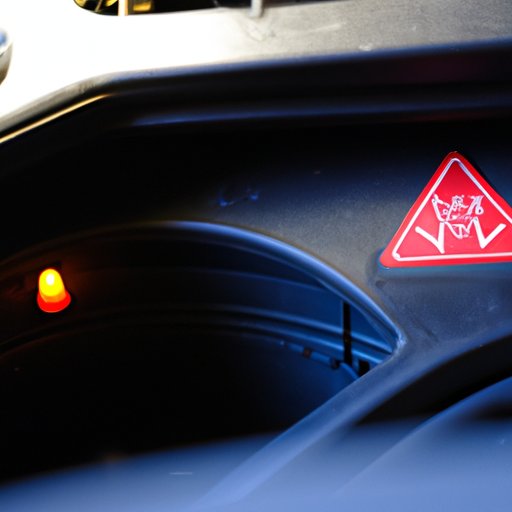
Introduction
An alternator is an essential component of your car’s charging system. It works by converting mechanical energy from the engine’s rotation into electrical energy that powers the car’s electrical systems and recharges the battery. If your alternator is failing, your car may not start, or it may die while you’re driving. Recognizing the symptoms of a failing alternator can help you avoid costly repairs and stay safe on the road.
Don’t Get Stuck: Recognizing the Telltale Signs of a Failing Alternator
A bad alternator can leave you stranded. If your alternator fails while you’re driving, your car’s battery will be drained, and your electrical systems will stop working. This can be dangerous, especially if you’re driving at night or in bad weather. Being proactive in identifying warning signs can help you avoid getting stuck on the side of the road.
Trouble Ahead: The Most Common Symptoms of a Bad Alternator
There are several symptoms that can indicate a bad alternator. If you notice any of these warning signs, it’s essential to have a professional check your car’s charging system as soon as possible:
- Dimming or flickering headlights
- Strange noises, such as whining or grinding
- Difficulty starting the car
- Electrical systems, such as power windows or the radio, not working properly
- The smell of burning rubber
It’s important to note that symptoms may present differently depending on the make and model of the car. For example, some cars may have a warning light on the dashboard that indicates a problem with the charging system.
When Your Car is Telling You Something: Identifying Symptoms of Bad Alternators
Being alert to subtle signs of a failing alternator can help you avoid a breakdown. Here are some tips on how to identify these symptoms:
- Pay attention to how your car drives. If it feels sluggish or slow to start, it may be a sign of a weak battery or a failing alternator.
- Listen for strange noises, such as whining or grinding. These can be signs of a loose or damaged alternator belt.
- Smell for burning rubber. If you smell this odor while driving, it could mean that your alternator belt is slipping or damaged.
- Inspect your battery regularly. Look for signs of corrosion or other damage that could affect the charging system.
If you notice any of these signs, it’s important to have a professional check your car’s charging system. Early detection of a failing alternator can help you avoid expensive repairs and keep your car running smoothly.
The Warning Lights You Can’t Ignore: How to Spot a Malfunctioning Alternator
Many cars have dashboard warning lights that indicate a problem with the alternator or charging system. If you see any of these lights, it’s essential to take action:
- Battery light: This light looks like a battery and indicates that your battery is not being charged properly.
- Charging system light: This light looks like a battery with a plus and minus sign and indicates that your car’s charging system is not functioning correctly.
- Check engine light: While this light can indicate a variety of problems, a failing alternator can trigger this warning.
If you see any of these warning lights, it’s important to have your car’s charging system checked right away. Ignoring these warnings can lead to costly repairs and potential safety hazards.
Charging System Failures and How to Identify Them
There are several issues that can affect your car’s charging system, such as a broken alternator belt or a faulty battery. Here are some common symptoms of charging system failures:
- A dead battery: If your car won’t start and the battery is dead, it could be a sign of a failing alternator or a faulty battery.
- Overcharging the battery: If your battery is overcharged, it can cause damage to the battery and other electrical components.
- Undercharging the battery: If your battery is not being charged properly, it can cause the battery to drain and other electrical systems to fail.
- Broken alternator belt: If the alternator belt is damaged or broken, the alternator will not be able to charge the battery.
If you notice any of these symptoms, it’s important to have a professional check your car’s charging system. A faulty charging system can cause damage to other electrical components and lead to costly repairs.
The Dangers of Ignoring a Failing Alternator: Know the Symptoms
Ignoring a failing alternator can lead to dangerous and costly consequences. If your alternator fails while you’re driving, your car’s electrical systems will stop working, and you may not be able to safely control your vehicle. Here are some examples of what can happen if a failing alternator is left unchecked:
- Your car’s battery can be drained, leaving you stranded.
- Your car’s electrical systems can stop working, causing a safety hazard on the road.
- You may be forced to pay for a tow truck and expensive repairs.
- In some cases, a failing alternator can damage other electrical components, leading to even more costly repairs.
Recognizing the symptoms of a failing alternator and seeking professional help at the first sign of trouble can help you avoid these dangers and stay safe on the road.
Conclusion
Your car’s alternator is an essential component of the charging system. Recognizing the symptoms of a bad alternator and staying alert to subtle warning signs can save you from getting stuck on the side of the road or facing costly repairs. Don’t ignore warning lights or strange noises, and have your car’s charging system checked regularly by a professional. By being proactive in maintaining your vehicle’s charging system, you can avoid dangerous and costly consequences and stay safe on the road.





